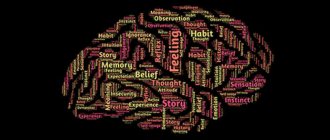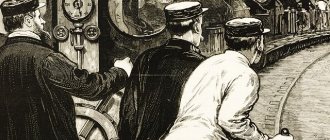Why know this?
What practical meaning can be derived from this knowledge?
Indeed, at first glance it may seem that the theory is informative and interesting, but nothing more. In fact, determining your locus of control and reconsidering your attitude towards what is happening to you is a powerful tool for self-development. A superficial analysis can be carried out even without seeking help from the mentioned questionnaires and tests based on them on the Internet. Just try to look at yourself from the outside and evaluate your attitude towards what happened in the near future. For example, you received a D on a test or your boss yelled at you for doing a bad job. What were your next steps? Did you conscientiously learn everything and correct mistakes in your work, because what happened was your fault? Or, cursing the teacher and boss for bias and injustice, did what was necessary “under the lash” just to be left alone? Of course, such options are not mutually exclusive, but in other cases they are less clearly related to locus of control.
Thus, by choosing the right series of questions and answering them honestly, you will receive a ready-made map that can indicate in which direction you should move next and which skills and qualities of your character to develop and which to get rid of. Expressed externality indicates that you need to learn to take responsibility, be more confident and proactive. Establish observation of yourself and everything that happens, learn to see your trace, and not just a coincidence.
Internals should ask themselves similar questions. Their reaction to a shift in locus should be to refuse to control things that do not need control. It is worth recognizing that it is impossible to foresee absolutely everything, much less influence it. Therefore, reproaching yourself every time something goes wrong is a stupid idea and promises depression. Seek harmony!
What is locus of control?
We all know fatalists in the traditional sense of the word. Or at least those who believe in astrology, horoscopes, omens, etc. For them, the predestination of existence is not a phrase from a philosophy textbook, but a real way of explaining certain events in life. For example, the bosses at work did not like the report - the fact that the Moon is in the third house played a role here. Are layoffs coming due to the crisis? Well, what can you do, they’ll fire you – that’s the fate.
In these examples, the colors are thickened specifically to contrast with those who, on the contrary, take full responsibility for their lives. The victories and defeats of such people belong only to them and no one else. They do not see or deny the excessive influence of external factors on the course of events that directly concern them.
In fact, we have described the two types of people that the concept of “locus of control” predetermines. If we follow scientific terminology, then this is a personality trait that manifests itself in assessing one’s ability to influence the course of events. The assessment itself, as you have already seen, can be of two types: faith in fate or faith in choice (this is poetic, more “dry” - below).
For the first time, an American scientist in the field of social psychology, one of the most influential theorists of social learning, Julian Rotter, became interested in this property. He proposed the term itself in 1954. Later, his followers and students took up the baton of studying this phenomenon, including the famous psychologist, researcher of the psychology of motivation and the nature of emotions Bernard Weiner. Today, scientists are also interested in it, especially from the fields of clinical, educational and health psychology. Locus of control remains a relevant topic due to the fact that it is one of the components that influence a person’s self-esteem.
Diagnostics and measurement techniques
In Russian psychology, the most common methods for measuring locus of control are:
- J. Rotter's locus of control scale. This method was developed by Rotter in 1966 and first published in Russian in 1984 by E. Bazhin. It represents 29 positions with different statements - “a” and “b” for each position, determining whether a person belongs to the external or internal type. Depending on the preferred statements, the person being tested scores points on the extreme positions of the internality or externality scale. However, the maximum possible number of points scored on each scale does not exceed 23, since 6 questions are “background”.
- USC questionnaire (level of subjective control) by E. F. Bazhin, co-authored with E. A. Golynkina and A. M. Etkind. This questionnaire consists of 44 items. Subscales were added to it concerning areas of success, situations of failure, attitudes towards health, professional and family relationships.
- OSLC (questionnaire for subjective localization of control) by S. R. Pantileev and V. V. Stolin. It consists of 32 points, 26 of which are working, and 6 are background. It has a one-dimensional scale that measures the direction of an individual's locus of control.
Description of the technique
USK methodology
(level of subjective control) has become most widespread in our country, the authors of which are E. F. Bazhin, E. A. Golynkina, L. M. Etkind.
This technique is based on the concept of locus of control by J. Rotter. However, Rotter considers the locus of control to be universal in relation to any type of situation: the locus of control is the same in both the sphere of achievements and in the sphere of failures. When developing the USC methodology, the authors proceeded from the fact that sometimes not only unidirectional combinations of locus of control are possible in situations of different types. This position also has empirical confirmation. In this regard, the developers of the test proposed to identify subscales in the locus of control diagnostic methodology: control in situations of achievement, in situations of failure, in the field of industrial and family relations, in the field of health.
In total, the USC questionnaire consists of 44 items.
In order to increase the reliability of the results, the questionnaire is balanced according to the following parameters:
1) according to internality-externality
- half of the questionnaire items are formulated in such a way that people with internal USC will give a positive answer to them, and the other half are formulated in such a way that people with external USC will give a positive answer to them;
2) by emotional sign
— an equal number of questionnaire items describe emotionally positive and emotionally negative situations;
3) in the direction of attributions - an equal number of points are formulated in the first and third person.
Unlike the Rotter scale, the questionnaire includes items measuring internality-externality in interpersonal and family relationships. For medical and psychological studies, it includes items measuring USC. regarding illness and health.
To increase the range of possible applications of the questionnaire, it is designed in two versions, differing in the format of the respondents’ responses.
Option A
, intended for research purposes, requires a response on a 6-point scale “-3, -2, -1, +1, +2, +3”, in which the response “+3” means “strongly agree”, “-3” - “completely disagree” with this point.
Option B
, intended for clinical psychodiagnostics, requires answers on a binary scale “agree - disagree.”
As studies conducted on normal subjects—students—have shown, responses to all points of the questionnaire have a sufficient spread: none of the halves of the scale was chosen less than 15% of the time. The results of filling out the questionnaire by an individual subject are converted into a standard system of units and walls and can be visually presented in the form of a profile of subjective control.
The indicators of the USC questionnaire are organized in accordance with the principle of the hierarchical structure of the activity regulation system in such a way that they include a generalized indicator of individual USC, invariant to frequent situations of activity, two indicators of the average level of generality, differentiated by the emotional sign of these situations, and a number of situation-specific indicators . Procedure Instructions
Read each of the statements below carefully and mark on your answer sheet:
- -3 – completely disagree
- -2 – partially disagree
- -1 – rather disagree than agree
- +1 – more likely to agree than to disagree
- +2 – I partially agree
- +3 – I completely agree
History of creation
Rotter's social learning theory appeared in the mid-1950s and was finally formed within 20 years. It arose in the context of American science aimed at positive knowledge. True, Adlerian psychology, focused on the social determinants of behavior, had a great influence on the choice of value bases. So, for example, axioms appeared: psychology should study the individual in the context of the surrounding world that is significant for him (axiom 1); personal constructs cannot be reduced to constructs of other sciences (axiom 2). But the influence of E. Tolman’s psychology, oriented towards the natural science approach, turned out to be stronger. This is reflected in the following axioms: behavior is purposeful and depends on reinforcement (axiom 6); goal orientation is determined by anticipation based on the experience of existing actions (axiom 7). At the same time, the neo-behaviourist tradition manifests itself in the theory of social learning and as a certain standard of scientificity, prescribing a strict formalization of initial concepts. Therefore, moving from methodological postulates to the construction of a theoretical model, Rotter tries to derive complex, “molecular” forms of behavior, which are targeted by social or clinical psychology, from elementary simple, “molar” ones, reproducible under regulated experimental conditions.
The main task of Rotter's theory is to predict behavior in a situation of choice from clearly defined alternatives. In accordance with the first concept of the theory, in a situation of choice, the action whose “behavioral potential” is higher will be implemented. The “behavioral potential” itself appears as the integration of two components: the subjective probability of reinforcement after an action, or “expectation,” and the subjective “value” of this reinforcement.
Then, trying to analyze these components and moving on to consider “value,” Rotter goes to the level of “molecular” forms of behavior. The “value” of the result of an action is expressed in the integration of the “value” of the action itself and the “value” of the consequences accompanying it.
But the author of the theory of social learning focuses on the deployment of the concept of “expectation”, which gives the following formalization: the subjective probability of an event occurring in a certain situation appears as the sum of a “specific expectation” determined by the experience of interaction with similar situations, and a “generalized expectation” based on experience solving a wider range of problems. At the same time, the role of “generated expectation” in the new situation will be decisive; in a typical situation, on the contrary, a “specific expectation” is realized, formed by the experience of interaction with this type of situation.
Rotter does not introduce concepts that would create a context for the concepts of “values” and “expectations”, for example: “dynamics of the motivational-need sphere” or “Self-concept”. This leads to the fact that a number of empirical data begin to contradict his theory. In particular, “values” and “expectations”, considered by him as independent, in fact turn out to be interrelated: with failure, the “value” of the goal decreases due to the association with unpleasant emotions. X. Heckhausen sees in this the fundamental limitations of non-situational (generalized) constructs in general compared to situation-specific ones, which raises some doubts in us. A possible solution to the issue under consideration is to describe “generalization” as a qualitative process that occurs along with the development of personal structures. For Rotter, generalization is a linear, quantitative process in which a series of experiences are generalized, so this concept remains purely descriptive for him, without experimental justification and not related to the mechanisms of creating the self-concept.
Study methodology
Back in 1966, Julian Rotter developed a technique that allows you to assess a person's locus of control. Many psychologists have tried to modify the test. Today, the classic version and modification of O.P. Eliseev “Cognitive Orientation” is most often used.
Locus of Control Scale
Helps to find out whether a person is internal or external. It also shows how ready he is to see himself, to evaluate his role, successes and failures in a particular area.
The test questionnaire for J. Rotter's locus of control scale contains 44 questions. You must either agree with the statement or refute it.
- Building a career depends on luck, and not on the efforts of the person himself.
- Divorces are a consequence of the fact that partners either do not want or do not know how to compromise.
- Everyone gets sick. It cannot be prevented or predicted.
- Cold, insensitive people are always alone.
- I can realize all my desires if I have luck.
- It is impossible to win sympathy. Whether the person likes you or not.
- Marriage depends on the money and influence of the parents as well as on the spouses themselves.
- I often think that I cannot change anything in my own life.
- The company will develop if all decisions are made by the manager, without relying on the opinions of subordinates.
- When I was at school, my performance did not depend on me, but on external factors, including the mood of the teacher.
- I am confident that I can achieve my plans.
- That I can achieve what I want, carry out all my plans.
- It is better to lead a healthy lifestyle than to go to doctors and take pills.
- If the partners do not agree on their personalities, they need to separate. You can't change anything here.
- My efforts and investments in the business are always appreciated.
- The future of children depends on how their parents raised them.
- There are no happy or unlucky cases, nor does fate.
- In this life, little depends on me, so I don’t make plans.
- While studying at school, my grades depended on my preparation for the lesson.
- When there are quarrels in the family, I consider myself to be to blame, not my partner.
- Most of the people around me are floating with the flow, surrendering to fate.
- I like it when employees can make decisions as well as the manager.
- My illnesses are not a consequence of my lifestyle.
- Mistakes and failures are the result of an unfortunate combination of circumstances.
- A bad manager is the fault of the employees.
- I think that I am unable to change family relationships.
- I just have to want it and I can win the sympathy of absolutely anyone.
- The future life of a child depends not so much on upbringing as on the influence of any external factors.
- Responsibility for everything that happens to me lies solely with me.
- Often I don’t understand why the manager acted this way and not otherwise.
- People who cannot build a career have themselves to blame.
- I know how to get what I need from those around me, including family members.
- Those around me are to blame for my failures.
- Careful child care is protection against many diseases.
- If it's difficult for me, I wait for the problems to be solved on their own.
- Success is not luck or coincidence. This is long, hard work on yourself.
- How happy my family will be depends only on me.
- I sincerely don’t understand why some people like me and others don’t.
- I never ask anyone for help. I always rely on my own strength.
- Often a person's contribution to a particular cause remains underestimated.
- Often, family problems cannot be solved, even if you really want to.
- Responsibility for untapped potential and undeveloped abilities lies with the person himself.
- Most of my victories are thanks to those around me.
- Almost all my failures are my fault, my laziness or lack of knowledge.
Kinds
What is the locus of control? Depending on how a person explains his achievements, there are two types of personal locus of control:
External locus of control. Another name for it is external locus of control. In this case, the individual is dependent on external circumstances. It is to them that he attributes his own success or failure - this may be the influence of other people or a certain situation in which it is difficult or, on the contrary, quite easy to carry out his plans - however, it is external factors that determine a person’s readiness to act and are dominant in his motivation to act.
Internal locus of control. Also known as internal locus of control
At the same time, the individual takes responsibility for the reasons for failure or success and believes that it was his actions and personal qualities that influenced the outcome of a particular situation that was important to him. In this case, internal human factors become decisive.
Types of people
According to psychologists, a person’s self-esteem is closely dependent on his locus of control. Anyone who constantly controls himself internally knows how to objectively assess his abilities and capabilities. He has a correct awareness of himself as a person. So, internals and externals. How are they different from each other?
Characteristics of internals:
- take responsibility for any of their actions;
- do not depend on the opinions of others;
- value themselves, are self-sufficient;
- have internal harmony;
- have a stable psyche;
- work for results.
People with an internal locus of control are usually happy, successful, and healthy. They treat others kindly. They look at the world through a positive lens.
Those with an external locus of control have the following traits:
- they don’t see their mistakes;
- do not know how to analyze mistakes and correct them;
- constantly feel helpless;
- depend on the opinions of strangers;
- have an unstable psyche;
- stop actions at the first failures.
A constant companion of externalities is a feeling of complete hopelessness. They are not happy, they experience weakness and malaise, and they do not receive joy from their lives. Such people show aggression, suspicion, and anxiety.
The main differences between externals and internals can be listed in the table.
| Internal locus of control | External locus of control |
| Looking to the future | Constantly going back to the past |
| They regard difficulties as additional life experience and see them as an opportunity to change and become better. | They are afraid of failures, shy away from something new, unknown |
| In any circumstances, they adhere to their own opinions | Unable to defend their views |
| Set goals and have planning skills | Irresponsible, delays solving problems until the last minute, does not like to plan |
| They devote a lot of time to work, for the sake of it they are ready to sacrifice entertainment and relaxation | Live one day at a time |
| They know that the future will be bright, full of good events, bright colors | See their future as uninteresting |
| For internals, time flies very quickly, because they are passionate about their work | Time drags on |
| Every minute is appreciated | They don’t know how to organize themselves and manage time correctly |
| Respect themselves as a person. I expect only good things for myself, good luck, victories, love | They are not confident in themselves, they believe that they will not get anything good in the future |
It is worth noting that people with an external locus of control are more likely than others to develop mental and somatic pathologies. Their lives have no purpose or meaning.
World of Psychology
LOCUS OF CONTROL
Locus of control
(English locus of control) - American term. psychologist Julian Rotter (Rotter, 1966) to refer to the ways (strategies) by which people attribute (attribute) causality and responsibility for the results of their own and others' activities. It is assumed that different people have a tendency (preference) for a particular type of attribution of causation and responsibility. In other words, people can differ greatly in the attributions they make for their own and/or others' successes and failures.
There are 2 polar ways of attributing causality and responsibility (Locus of control). In one case, causality and responsibility are attributed to the acting personality itself (its efforts, abilities, desires) - this strategy is called “internal” (“internal Locus of control”, “subjective L.K.”), in another case “responsibility is assigned” to factors independent of the individual - external circumstances, accidents, luck, the mystical factor of fate, the fatal effect of heredity, etc.; the second method is called “external physical therapy.”
According to the degree of propensity for these 2 personality traits, people are classified into internals and externals. More precisely, this is the name given to individuals who receive extreme scores on the internality scale. The terms “internals” and “externals” should not be confused with the consonant terms “introverts” and “extroverts.”
In the domestic literature, the term “Locus of control” is often replaced by “locus of subjective control”, and the modified Rotter questionnaire is called the “Subjective Control Level Questionnaire” (abbr. “USK Questionnaire”). (B.M.)
Psychological Dictionary. A.V. Petrovsky M.G. Yaroshevsky
Locus of control (from Latin locus - place, location and French contrüle - check) is a quality that characterizes a person’s tendency to attribute responsibility for the results of his activities to external forces (external or external locus of control) or to his own abilities and efforts (internal or internal Locus of control ).
The concept of Locus of Control was proposed by the American psychologist D. Rotter. Locus of control is a stable property of an individual, formed in the process of his socialization. To determine the Locus of Control, a questionnaire was created and a set of techniques was developed to identify the natural connection between L.K. and other personal characteristics. It has been shown that people who have internal personal qualities are more self-confident, consistent and persistent in achieving their goals, prone to introspection, balanced, sociable, friendly and independent. A tendency toward external love, on the contrary, manifests itself along with such traits as lack of confidence in one’s abilities, imbalance, the desire to postpone the implementation of one’s intentions indefinitely, anxiety, suspicion, conformity, and aggressiveness. It has been experimentally shown that internal personality is a socially approved value (the ideal self (see self-ideal) is always attributed to internal personality).
Dictionary of psychiatric terms. V.M. Bleikher, I.V. Crook
no meaning or interpretation of the word
Neurology. Complete explanatory dictionary. Nikiforov A.S.
no meaning or interpretation of the word
Oxford Dictionary of Psychology
Locus of control is a general term used in social psychology to refer to the perceived source of control over one's behavior. It is assessed according to the dimension - from high internal to high external. Internals are those people who tend to accept responsibility for their own actions and view themselves as having control over their own destinies, while externals are those who tend to view the source of control as permanently located elsewhere and attribute success or failure to external factors. forces.
Note that reality is not measured here; the question is not whether real control comes from exogenous or endogenous sources, but how the individual perceives it. Cm
attribution theory, internality-externality scale.
subject area of the term
INTERNAL LOCUS OF CONTROL is a feature of a person when he takes responsibility for the events of his life and sees their reasons in his behavior and his personal characteristics.
EXTERNAL LOCUS OF CONTROL is a feature of a person when he attributes responsibility for the events of his life and his personal characteristics to external environmental factors, surrounding people, and “fate.”
back to section
:dictionary of terms
/glossary/table
Basic Concepts
…
Locus of control
One of the central concepts of social learning theory is a personality variable called locus of control
(
locus of control
)
- a person’s generalized expectations
regarding the extent to which
reinforcements
depend on his own behavior (internal locus) and to what extent they are controlled by external forces (external locus of control).
In Rotter's view, reinforcers are not automatically imprinted into patterns of behavior, but behavior is shaped by people's ability to perceive a causal relationship between their actions and the occurrence of reinforcers (Rotter, 1954; Rotter & Hochreich, 1975). People try to achieve their goals because they have a generalized expectation
that such efforts will succeed. People who tend to believe that they can control their destiny (those with an internal locus of control) behave differently in many (but not all) situations than people with an external locus, who usually believe that their destiny depends on luck. chance or those in power.
In the fifties and early sixties, Rotter and his students E. Jerry Phares and William H. James began a systematic study of how humans evaluate their control of external reinforcers. The impetus for this was the fact that, according to observations, many people do not begin to feel more able to manage events in their lives even after achieving success, while others do not lower their level of expectations after multiple failures (Rotter, 1990, 1993; Zuroff & Rotter, 1985). In other words, some people tend to attribute successful outcomes to luck or chance, while others maintain a sense of control over the environment even if their behavior goes unrewarded several times. This seems especially true in situations that people view as ambiguous or new (Rotter, 1992), and when they are not sure whether success is due to skill or chance. Rotter (1990) suggests that both the situation and the personality influence a person's sense of control over their life. Thus, a person with a generalized expectation of success in one situation may feel unable to control events in another.
One of Rotter's most significant achievements in the study of locus of control
was the creation of the Internal-External Control Scale, designed to determine the extent to which people are aware of the connection between their own actions and their consequences in the world around them. The scale contains 29 pairs of statements; in each case, the subject must choose the one that seems most correct to him. Of the 29 points of the scale, 23 are significant, in which one of the statements indicates the predominance of internal control, and the other - external, and 6 pairs of “empty” ones, intended to disguise the purpose of testing. The scale is set up so that its readings increase with increasing external control, so 23 is the highest possible indicator of external control, and 0 is the highest possible internal control. In table 23.1 shows several items of the Internal and External Control Scale as an example. The external or internal orientation of each of the statements is clear, but Rotter (1990) reported that the results had only very little correlation with test scores on a scale of socially acceptable behavior.
People who show a high level of internal control, in other words, have an internal locus of control
, usually believe that the source of control lies within themselves and that they can exercise a high level of personal control in most situations.
People with an external locus
, who show high levels of external control, believe that their lives are largely controlled by external forces, such as chance, fate, or the behavior of other people.
The concept of locus of control
has proven to be a very powerful tool for theoretical psychology, but the concept of internal and external control is not always well understood.
Although Rotter (1975) has already pointed out several common errors regarding the interpretation of locus of control
, many continue to misunderstand the concept and misapply the data obtained from using the scale. The most common misconceptions today are the following four:
— The level of control supposedly determines behavior. In fact, the level of control over the environment that the scale provides should not be seen as the cause of a person's actions, but as indicators of his generalized expectations
.
Thus, scale readings must be used in conjunction with reinforcer values
.
- Using locus of control
as if it were possible to predict behavior in specific situations.
Here again it must be emphasized that the concept of internal and external control refers only to generalized
expectations and indicates the extent to which a person usually considers himself capable of managing his life.
- The results of measurements on the Internal and External Control Scale supposedly divide people into two clearly different types - internally and externally controlled. Rotter (1975, 1990) has always insisted that generalized expectations provide direction
generalizations and that in some specific situation a person with a generally high sense of internal control may also hold chance or the behavior of those in power responsible for the results of their actions.
—High levels of internal control indicate socially desirable traits, while high levels of external control indicate socially undesirable characteristics. In reality, extreme values on either side are undesirable. Too much external control can be associated with apathy and despair, where a person believes that they have no control over their life, while too high a level of internal control can mean that a person accepts responsibility for everything that happens to him. happens - accidents, failures in business, pranks of your children, and so on. Perhaps the healthiest and most desirable level is somewhere between these extremes, with some bias toward internal control.
The popularity of the Rotter Internal and External Control Scale is evidenced by the fact that since its inception in 1966, it has been mentioned in more than seven thousand scientific publications. And the concept of locus of control
is closely studied not only by psychologists, but also by representatives of other social sciences.
Table 24.1. Sample questions from Rotter's Internal and External Control Scale
1. A. Many unpleasant things happen in human life as a result of bad luck.
B. Failures are the result of one’s own mistakes.
2. A. One of the main reasons for the existence of wars is that people have little interest in politics.
B. There will always be wars, no matter how hard people try to prevent them.
3. A. Ultimately, each of us gets what he deserves.
B. Unfortunately, a person often cannot be appreciated, no matter how hard he tries.
4. A. The average citizen can influence government decisions.
B. The world is ruled by the few who have power, and the common man can do little about it.
5. A. It is nonsense that teachers behave dishonestly towards students.
B. Most students do not realize how much their grades depend on chance.
6. A. Regardless of your efforts, some people just don't like you.
B. People who do not know how to please others simply do not understand how to behave with others.
(Source: J. W. Rotter, “Generalized Expectancies for Internal Versus External Control of Reinforcement,” Psychological Monograph, 80 (general issue 608), 1966. Copyright © 1966 American Psychological Association.)
—
When failure occurs, a person usually either blames himself for what happened, realizing the mistake and realizing that next time he will need to act differently. Or he blames everyone, even the weather or the eclipse of the moon. Therefore, psychologists usually divide the external type, that is, focused on external circumstances, and the internal type, which knows how to take responsibility for one’s life and its quality. You can see the article “What is a locus of control and how to determine whether it is external or internal.” More detailed information is provided there. Now let's check what type you are? Take our locus of control test to determine which one you have.
Locus of control test
Control is one of the relatively advanced devices for regulating cognitive mental processes. It determines the relationship of subjects with the environment in such a way that both the objective qualities of stimulation and the needs of the individual are taken into account.
Observations and experiments made by Rotter allowed him to make the assumption that certain people have a strong feeling that everything that happens to them is determined by external circumstances, while others think that everything that happens to them is the result of their personal abilities and effort. As a result, he proposed to call such an attitude a locus of control.
The locus of control technique presented by Rotter includes 29 pairs of judgments. He proceeded from the fact that the locus can change and is dependent on the areas of the subject’s life. Therefore, the questionnaire items correspond to several areas, such as situations leading to affects, academic recognition, general worldview, social and political activity, social respect, dominance.
As a result of processing, two positions are obtained: internality and externality. Thus, in one field there are subjects who believe in their own ability and potential to control life events, i.e. internal locus of control. In the other field there are subjects who are convinced that all life’s punishments and rewards are a consequence of external conditions, such as fate, chance, i.e. external locus of control.
The Internality–Externality Scale was developed to measure personal differences in the perception of whether success or failure is under external or internal control. The scale developed by Rotter is designed to assess an individual's control over his own actions. By the comparative excess of the final calculations of one parameter over another, one can judge the aspiration of the locus of control. However, the scale proposed by Rotter offers only one dimension of the expectancy component.
Therefore, this scale subsequently stimulated numerous studies and the development of new measurements. Some suggested using factor analysis to refine the components of the scale. Thus, for example, the need is shown to distinguish control by chance or other people, as well as externalities capable and incapable of defensive reactions, as parameters of externality. Externals who are unable to respond defensively may take more personal responsibility for their actions than those who are capable.
Research has also shown that internals are more likely to understand themselves as capable of controlling events. Along with this, externals are more likely to explain what happened by luck, fate, chance or other external circumstances. Internals are considered more self-confident than external people.
However, Rotter's approach cannot explain why one individual sees the reasons for success or failure in himself, while others see the reasons for success or failure in external factors.
Examples
An external locus of control makes a person believe that everything good and bad happens in his life due to external circumstances. For example, he can give the following explanations for the events happening to him:
- graduated from university with bad grades because the education system in the country is bad;
- I was late for work because there were traffic jams;
- the salary is low because the management does not appreciate it;
- It is not possible to get rid of excess weight due to bad heredity.
He also explains positive events by external circumstances. For example, many students believe that they entered the university by pure luck, and subsequently it seems to them that they are often lucky in their studies. And yet, much more often, externality manifests itself in the fact that a person blames circumstances and others for his troubles.
Individuals with an internal locus of control consider events that happen to them to be their own achievements or failures. Typically their explanations look like this:
- I didn’t study very diligently, that’s why my grades were bad;
- I was late for work because I left very late;
- the salary is low because there are not enough qualifications for promotion;
- excess weight cannot be lost due to poor eating habits and reluctance to exercise.
Of course, individuals with an internal locus of control also credit positive events to their own merits. They consider good education, discipline, a slim figure, high income, etc. exclusively as personal achievements. In communication, such people are more pleasant, because they are always confident in themselves and almost never exude negativity.
How to identify this type?
There are many tests to determine the socionics of a person. It’s more difficult with this person, since there are very few such people. The tips described in this subsection have a somewhat humorous form:
- Having barely learned to speak, the child pronounces the word “physics.” With them he replaces the classic mother. If your little one is like this, he may have an INTP personality type.
- Instead of Little Red Riding Hood, does your child ask you to read a math textbook to him? Exactly - the future Einstein is growing.
- During his school years, he is able to unbalance a chemistry teacher by asking him questions to which he does not know the answers.
Joking aside, according to Myers Briggs, the INTP personality type can be called a scientist, a thinker, or an architect.
Characteristics of this type
How would you characterize this personality type (INTP)? First of all, people of this type are very reserved and cold-blooded. They are convinced introverts who love to spend time alone with themselves. And with complex riddles, of course.
Theory is everything to them. It is very easy for a person with this type of personality to find solutions to the most complex theoretical problems. But a practical everyday task throws him into a stupor. For example: I can discover Newton’s fourth law, but nailing a nail at home or cooking borscht is very difficult.
Tolerance. “Scientists” are very tolerant, despite their isolation. They communicate little with people, preferring solitude. Perhaps more frequent appearances would make them reconsider their views on tolerance.
The thinking of such people is not limited by boundaries. They know how to think in such a way that an ordinary person simply cannot see the horizons of such thinking. As they say, they think on all planes.
Flexibility. A person of the “scientist” type is difficult to subjugate. But in communication he often shows flexibility. Of course, when we are not talking about infringing on his rights to solve his favorite complex problems.
They rely only on their own mind. If our theoretical logician said that the Earth is square, he cannot prove that it is round. She still won’t believe it, it’s useless to even try.
Goal-oriented people. They will achieve their goals regarding science. They will spend years and decades of their own lives, but they will solve the problem.
Due to their logical thinking, it is difficult for these people to understand someone who lives by emotions. In their actions and judgments, our heroes are guided only by logic and common sense. Therefore, in a society of emotional people, the “scientist” has a desire to twirl his finger at his temple and quickly run away into his own hole.
Have a broad outlook. It is impossible to work on a complex task with little knowledge. He knows everything about his problem, which our fellow “scientist” is working to resolve. If you wake him up in the middle of the night and ask, he will immediately answer without hesitation.
These people have one thing going for them. They are among those who are afraid of their own failures. Just panicky. And if such a person is haunted by failures, things may end badly. Someone whose personality type is INTP can even go as far as committing suicide.
Processing the results
The results are processed in several stages:
1. Using the key, “raw” points are calculated for each scale:
The number corresponding to the choice determines the number of points received for each answer. In this case, points for answers to questions with a “+” sign are summed up with their sign, and for questions with a “–” sign - with the opposite sign.
Key
| Scale | «+» | «–» | Σ |
| And about | 2; 4; 11; 12; 13; 15; 16; 17;, 19; 20; 22; 25; 27; 29; 31; 32; 34; 36; 37; 39; 42; 44 | 1, 3, 5, 6, 7, 8, 9, 10, 14, 18, 21, 23, 24, 26, 28, 30, 33, 35, 38, 40, 41, 43 | |
| Eid | 12; 15; 27; 32; 36; 37 | 1; 5; 6; 14; 26; 43 | |
| In | 2; 4; 20; 31; 42; 44 | 7; 24; 33; 38; 40; 41 | |
| Is | 2; 16; 20; 32; 37 | 7; 14; 26; 28; 41 | |
| IP | 19; 22; 25; 31; 42 | 1; 9; 10; 24; 30 | |
| Them | 4; 27 | 6; 38 | |
| From | 13; 34 | 3; 23 |
2. “Raw” points are converted (Σ) into walls.
Table for converting raw scores into standard scores
| Walls | "Raw" points | |||||||||||||
| io interval | ID interval | In interval | Is interval | IP interval | Im interval | From interval | ||||||||
| from | before | from | before | from | before | from | before | from | before | from | before | from | before | |
| 1 | -132 | -14 | -36 | -11 | -36 | -8 | -30 | 12 | -30 | -5 | -12 | -7 | -12 | -6 |
| 2 | -13 | -3 | -10 | -7 | -7 | -4 | -11 | -8 | -4 | -1 | -6 | -5 | -5 | -4 |
| 3 | -2 | -6 | -3 | -3 | -7 | -5 | 3 | -4 | -3 | -3 | -2 | |||
| 4 | 10 | 21 | -2 | 1 | 1 | 4 | -4 | -1 | 4 | 7 | -2 | -1 | -1 | |
| 5 | 22 | 32 | 2 | 5 | 5 | 7 | 3 | 8 | 11 | 1 | 1 | 2 | ||
| 6 | 33 | 44 | 6 | 9 | 8 | 11 | 4 | 6 | 12 | 15 | 2 | 4 | 3 | 4 |
| 7 | 45 | 56 | 10 | 14 | 12 | 15 | 7 | 10 | 16 | 19 | 5 | 6 | 5 | 6 |
| 8 | 57 | 68 | 15 | 18 | 16 | 19 | 11 | 13 | 20 | 23 | 7 | 8 | 7 | 8 |
| 9 | 69 | 79 | 19 | 22 | 20 | 23 | 14 | 17 | 24 | 27 | 9 | 10 | 9 | 10 |
| 10 | 80 | 132 | 23 | 36 | 24 | 36 | 18 | 30 | 28 | 30 | 11 | 12 | 11 | 12 |
3. The received assessments within the walls are entered into the table:
Interesting experiments
Such a locus of personal control allows a person to defend and protect his interests, from everyday everyday events to participation in political actions. To illustrate, we present the results of another experiment by J. Rotter.
The respondents were college students who were active participants in various movements fighting for civil rights. The results were expected, because among these people the majority had an internal locus of control.
An interesting experiment is about the dangers of smoking. Participants were given information on the packs about the negative effects of cigarettes (the study was conducted in the 60s of the 20th century). After such a message, the internals tried to quit smoking, but the externals relaxed and let everything take its course - come what may. Individuals with an external locus of control counted on help from doctors, magic pills, and fate, but did nothing themselves to change their condition.
Interesting pattern
Based on the above information, we can say that the internal locus has a much more beneficial effect on human life. It is this pole that increases labor productivity, brings a person pleasure from the actions performed, and also contributes to the development of resistance to external influences. However, if this pole is overexpressed, there are also negative consequences. Each individual should have only realistic incentives that can be achieved through targeted actions. Desires to change circumstances that are not subject to external influence can provoke a state of frustration and the development of depressive syndrome.
An objective assessment of one’s own capabilities is closely interconnected with the state of society
That is why overseas researchers pay such close attention to the locus of control. Many foreign countries are characterized by stability in the field of law and economics
This leads to the fact that the vast majority of residents of such countries perform various actions based on their internal state. From this we can conclude that the internal pole is not typical for residents of countries with unfavorable social conditions. This can be explained by the fact that in such countries global events rarely depend on the actions of a particular person. The main influence on human life here is exerted by external forces.
It is important to note that the methodology used to determine membership in one of the conditional groups has several interesting nuances. According to its author, locus of control is an unstable value and can change throughout a person's life. Changes in outlook on life can be facilitated by changes in the political or economic sphere
Family values also play an important role in this matter.
Changes in outlook on life can be facilitated by changes in the political or economic sphere. Family values also play an important role in this matter.
The educational process involves learning to be independent and take responsibility for all decisions made and actions taken. The methods and severity of parenting are decisive factors in the choice of locus of control.
https://www.youtube.com/watch?v=246Jx9BeZAk
Locus of Control Test
The purpose of the technique is to determine the characteristic orientation of the individual towards external (external) or internal (internal) stimuli. Instructions – the test contains 44 short statements. It is necessary to imagine the situations described and select the answer: “+” (“yes”), “–” (“no”).
Who is to blame for successes and failures in life?
We need negative or positive answers to the following statements:
- Career growth is a gift of fate, not human effort.
- Divorces occur between people who are not ready to make concessions to each other.
- Getting sick is a matter of chance; if you are destined to get sick, there is no escape.
- The reason for loneliness is a lack of interest and friendliness towards others.
- The fulfillment of desires depends on luck.
- There is no point in trying to gain the sympathy of others.
- Welfare affects family happiness no less than the relationship between spouses.
- I have little influence on what is happening.
- The effectiveness of leadership lies in controlling the actions of subordinates, rather than relying on independence.
- Grades at school depend on the mood of the teacher, and not on your own efforts.
- I believe in realizing my own plans.
- Luck is the result of long efforts.
- A healthy lifestyle helps your health more than pills and doctors.
- If people are not compatible, their efforts to create a life together will be in vain.
- My good deeds are highly appreciated by others.
- Children's behavior is the result of parental education.
- Chance or fate has no significant meaning in life.
- I don’t think ahead, because much in life depends not on me, but on circumstances.
- My performance at school depended on my own efforts and readiness.
- I feel guilty in family quarrels.
- People's lives are determined by a combination of circumstances.
- I prefer guidance that allows me to figure things out on my own.
- Lifestyle does not affect possible illnesses.
- An unfortunate combination of circumstances interferes with success.
- Employees are responsible for poor company management.
- I cannot change the existing relationships in the family.
- If desired, I will win over any person.
- The younger generation is influenced by various circumstances; the efforts of relatives in education are useless.
- I myself am to blame for what is happening.
- Sometimes it is difficult to characterize management decisions in a given situation.
- A person who has not achieved success at work has not shown enough effort.
- I get what I want from my family.
- Other people are to blame for my failures.
- A child can be protected from a cold if you take care of prevention.
- With the onset of a “dark streak”, I wait until the problems are resolved in their own way, without trying to change anything.
- Success is the result of hard work and depends little on fate.
- The happiness of my family depends on me.
- I don't understand why some people like me and others don't.
- I make decisions and act independently, without relying on chance or the help of strangers.
- The merits of people often remain unrecognized, despite their diligence.
- Sometimes it is impossible to find a way out of a family situation even with a strong desire.
- Talented people who have not realized their own abilities have only themselves to blame.
- Many successes are achieved with the help of outsiders.
- Most failures are caused by laziness, a small number depend on luck.
Testing the organization's employees for locus of control
To determine your own locus of control, you need to count the number of answers on a separate scale, each match is equal to one point on it. For example, 4 positive and 6 negative answers matched, the total amount was 10 points.
General internality scale:
- «+» 2, 4, 11, 12, 13, 15, 16, 17, 19, 20, 22, 25, 27, 29, 32, 34, 36, 37, 39, 42, 44;
- «–» 1, 3, 5, 6, 7, 8, 9, 10, 14, 18, 21, 23, 24, 26, 28, 31, 33, 38, 40, 41, 43.
Processing the results:
- 0-11 points – externality;
- 12-32 points – mixed type (depending on the circumstances, the person behaves like an internal or external type);
- 33-44 points – internal.
About the algorithm for calculating the number of points based on these answers, detailed information can be found on the Internet. In psychology, locus is not a diagnosis, but a relatively stable value that can change throughout life under the influence of various factors: economic, legal, social. If a person grew up in a loving family, his parents instilled the habit of taking responsibility for himself, there is a high probability of developing an internal locus of control. Pupils of pupils with authoritarian, strict, unpredictable parents are external. People are capable of acquiring an internal locus or, conversely, freeing themselves from unhealthy self-control independently throughout their lives.
Theoretical basis
For the method of cognitive orientation, it is important that externals have weaker motivation than internals, and hence the tendency to conformism and dependence. There is a positive correlation between internality and the determination of the meaning of life: the more a subject believes that everything in his life depends on his personal efforts and abilities, the more often he finds meaning in his own life and the better he sees its goals.
For supporters of behavioral theory and behavior researchers, it is interesting that analysis of the structure of the locus of control makes it possible to discover the direction of an individual’s action, predicting the conditions that promote or interfere with this, and the dependence of behavior on reinforcements.
When working with antisocial groups, the technique can be used to identify anxious, maladjusted adolescents with an external locus of control. This will help to provide them with timely assistance before the state of prolonged stress leads them to commit illegal acts or suicide attempts. There is evidence of a greater tendency of externals to deceive and commit immoral acts. The connection between the level of subjective control and the behavior of adolescents and young people in criminogenic and post-criminogenic situations is also considered.
In management psychology, the differences between internal and external personalities can be used; they can turn out to be significant from the point of view of their professional activity. For example, externals are characterized by greater susceptibility to manipulation, they are more compliant and sensitive to the opinions and assessments of others. In general, externalizing individuals appear to be good performers who work effectively under the control of other people. Internals, unlike externals, work more productively not in a team, but alone. They are more active in searching for information. In addition, internal personalities cope better with work that requires initiative. They are more decisive, self-confident, principled in interpersonal relationships, and are not afraid to take risks. Research shows that internal leaders are able to successfully exercise directive leadership. Internal and external personalities also differ in other features, for example, self-esteem. People with an internal locus of control think of themselves as kind, sociable, friendly, determined, calm, honest, and self-sufficient. And people with an external locus of control consider themselves dependent, irritable, dependent, selfish, indecisive, unsure of themselves, and hostile to the environment.
The identification of a personal characteristic that describes the extent to which a person feels like an active subject of his own activity, and to what extent he feels like a passive object of the actions of other people and external circumstances, is justified by existing empirical research and can contribute to further study of a wide range of problems in general and especially applied personality psychology Moreover, the subject of psychological analysis is increasingly becoming the subject of various forms of voluntary activity of the individual, his everyday consciousness, types of explanation of the world around him, worldviews, and a person’s attitude towards his destiny.
Variants of this test have been developed for adults, schoolchildren and even preschoolers. There is also a version for national minorities. All of these options underwent thorough psychometric testing during their creation. For the original version, reliability testing was carried out by splitting the test and repeating it after 2 months. This check showed that the test is quite reliable. The same can be said about its validity.
So, according to research, people with a predominance of internal locus of control are more self-confident, calm, positive, they have easier interpersonal relationships, and they are more independent. People with an external locus of control are characterized by increased anxiety, less tolerance towards others, and less popularity and conformity.
Locus development
In fact, both external and internal loci must be equally developed in a person in order to achieve harmony in the human personality. And the development of this very locus of control is primarily influenced by a person’s upbringing in the family. Which is quite natural, because some special personal qualities begin to be instilled from a very young age. Parents need to understand that punishments must be truly deserved, and not received because of the bad mood of mom (dad). Don't forget about rewards (by the way, the power of rewards can awaken in a child the desire to do something right in order to deserve more rewards). Praise your child if he really tries. Praise for nothing. But under no circumstances encourage or praise the guilty child. Give him time to comprehend his mistake and feel guilty. The child must learn to understand and think about his actions, thereby learning to behave adequately in society. By correctly distributing measures of restraint and praise, you can successfully raise a person who has the norm of both internal and external control. Of course, parents can convince the child that he is not to blame for anything, that “the door itself hit him,” but you need to understand that everything must have a golden mean. By attributing obvious guilt to other people or objects, a person deprives himself of some significant share of responsibility and in the future is quite capable of ceasing to understand the relationship between an act and a consequence. And this already leads to the need to contact psychologists. For example, think about whether it will be bad for your child (and quite possibly for you too) if you keep telling him “Don’t cry, it’s not your fault!”, even if you probably know that the child is crying to be they were sorry and did not punish. You have to pay for everything, both for your mistakes and misdeeds. And the child must learn to understand this from a very early age. Another thing is to support a child when he is really not to blame for what is happening. Probably many have encountered the problem of spoiled children. Most often, children who were allowed everything and were never punished for anything grow up to be overly self-confident and arrogant adults, capable of committing actions the consequences of which should be regretted. But such people do not always regret, simply because they do not consider themselves guilty. “That’s how the circumstances turned out.” That is, the child gradually gets used to the fact that with his screams and hysterics he achieves whatever he wants. He carries this ability into adulthood. It is very difficult to find a common language with such people. They tend to be rude and overconfident. And most importantly, they do not value other people’s work and do not at all strive to put any of their efforts into achieving their goals. According to them, others will do everything for them. At the same time, it would seem that it is necessary to cultivate in a person a sense of responsibility for his actions. But again, in moderation. Blaming yourself always and for everything is also not an option. If you use this method exclusively in raising a child, there is a huge chance that he will grow up to be a “stuck” citizen, always afraid of everything. For example, as a child, a boy was forbidden to walk in the yard with the guys; they shouted at home all the time: “Don’t take this! Don't stand rooted to the spot! Move away! Don't interfere! Don't touch it! and so on. The child, getting used to the feeling of danger, has closed himself off, he has no friends, no desires of his own (because he is also not allowed to desire), no confidence in his actions. Whatever he does will most likely (in his opinion) be wrong. This boy, if things continue like this, will grow up to be an extremely shy, insecure and almost certainly very lonely man. Professional educators often mention the need for parents to weigh their requests and orders. The child perceives them much more accurately and effectively when given in small, portioned and, most importantly, reasonable quantities. The indisputable influence of the following factors on the development of one or another type of locus of control in a person has long been proven. Firstly, if a person was brought up and received holistic experience (the parents’ tasks and teachings were consistent with each other and took into account the interests of the child himself), then the level of internal locus noticeably approached the norm. By the way, the level of internal control is also influenced by what kind of child you are in the family. An only child is selfish, as many say, but everything again depends on the behavior of the parents. First-born children also have a moderate level of internal locus, because Since childhood, they have had at least some responsibility for their younger brothers and sisters.
Personal life
Someone will be surprised: how can a “mad scientist” have a personal life? He is obsessed with his science.
How could it? And such people get married and get married. Only the chosen one will have a difficult time with his soulmate. The latter is able to earn good money using her own mind. But this prospect does not appeal to our wise guy. He works on his tasks for pleasure, not for money.
The spouse will have to take on not only the household chores, but also work hard.
As for children, the “scientist” treats them evenly. He loves, of course, but without fanaticism. The main thing for him is that children do not interfere with self-realization.











